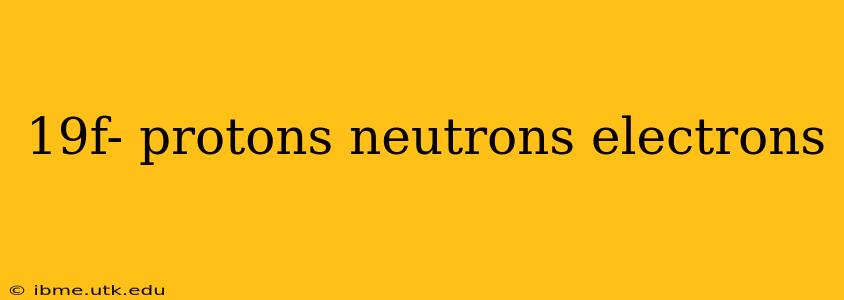Fluorine-19 (¹⁹F) is a stable isotope of the element fluorine. Understanding its composition requires knowledge of atomic structure. Let's break down the number of protons, neutrons, and electrons in a ¹⁹F atom.
How Many Protons Does Fluorine-19 Have?
The atomic number of an element defines the number of protons in its nucleus. Fluorine's atomic number is 9, meaning every fluorine atom, including ¹⁹F, has 9 protons. This is a fundamental characteristic that determines the element's identity. Changing the number of protons transforms the atom into a different element entirely.
How Many Neutrons Does Fluorine-19 Have?
The mass number of an atom is the sum of its protons and neutrons. The superscript '19' in ¹⁹F represents its mass number. Since we know fluorine has 9 protons, we can calculate the number of neutrons:
Mass number = Protons + Neutrons
19 = 9 + Neutrons
Therefore, Fluorine-19 has 10 neutrons.
How Many Electrons Does Fluorine-19 Have?
In a neutral atom, the number of electrons is equal to the number of protons. This ensures a balanced electrical charge. Consequently, a neutral Fluorine-19 atom has 9 electrons. This balance is crucial for the atom's stability. Gaining or losing electrons results in the formation of ions, which have a net electrical charge.
What are Isotopes?
It's important to understand the concept of isotopes. Isotopes are atoms of the same element (same number of protons) that have different numbers of neutrons. Fluorine has only one stable isotope, ¹⁹F. Other isotopes of fluorine exist, but they are radioactive and unstable. The difference in neutron number affects the atom's mass but not its chemical properties.
What Determines an Element's Chemical Properties?
The chemical behavior of an element is primarily determined by the number of electrons in its outermost shell (valence electrons). Fluorine, with 7 valence electrons, is highly reactive and readily forms chemical bonds to achieve a stable electron configuration (octet rule).
What are the Applications of Fluorine-19?
Fluorine-19, due to its nuclear properties, has applications in various fields, including:
- Nuclear Magnetic Resonance (NMR) spectroscopy: ¹⁹F NMR is a powerful technique used in chemistry and medicine for analyzing molecular structures.
- Medical imaging: Fluorine-18 (¹⁸F), a radioactive isotope, is used in PET (Positron Emission Tomography) scans for medical diagnosis.
This comprehensive explanation covers the fundamental aspects of Fluorine-19's composition, clarifying the number of protons, neutrons, and electrons and touching upon related concepts and applications. Understanding these fundamentals is crucial for comprehending the nature of matter and its behavior in various scientific contexts.
